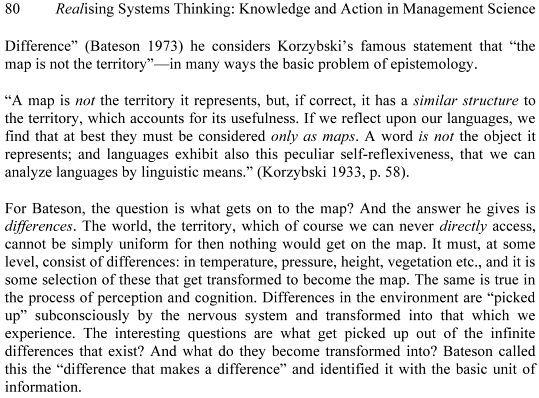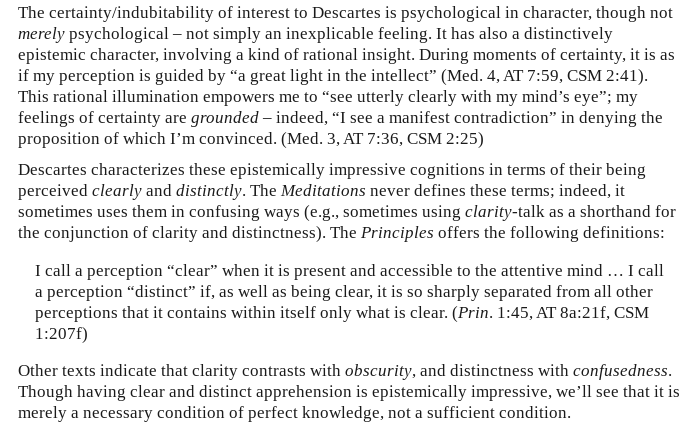I have heard that knowledge is discerning differences or to that effect. For example, if all things are the same such that there is no differentiating qualities, we can't really speak of anything interesting (think about pitch-dark environment). I was taken by it when I heard it the first time, and now and then I think about it and it seems so true in all respects from a particle to complex ideas. Where/whom does this idea come from?
-
1This sounds like a very rough account of Hegel's view where knowledge is difference (differentiation via negation).– virmaiorCommented Sep 2, 2015 at 0:45
-
This also sounds like one definition of consciousness. That the bare act of being conscious of something is realizing it differs from another (that other could be the background). Not sure where I read this, or how much of it is my own projection of stuff I later read :)– R. BarzellCommented Sep 2, 2015 at 14:21
-
It's also true that similarities are important between widely differing concepts: the early modern notion of the atom was modelled, for example, on the motion of planets around the sun.– Mozibur UllahCommented Sep 3, 2015 at 20:03
-
Regarding your "pitch-dark environment", someone I know said that the reason that everything exists (what is called Experience) is that "The Void can't know itself." It made stuff so that it could know anything. So you are correct. It doesn't matter who said it.– user16869Commented Mar 15, 2016 at 2:39
-
Gosh, I think that was me! j/k!– Ted WrigleyCommented Oct 1, 2023 at 14:53
6 Answers
You may be referring to the motto extracted from Spinoza: Omnis determinatio est negatio, every determination is negation. As applied to knowledge, it means that we know something by knowing what it is not, what it differs from. Spinoza's wording in his 1674 letter to a friend is not as succinct:
"...he who says that he apprehends a figure, thereby means to indicate simply this, that he apprehends a determinate thing and the manner of its determination. This determination therefore does not pertain to the thing in regard to its being; on the contrary, it is its non-being. So since figure is nothing but determination, and determination is negation, figure can be nothing other than negation."
The one who transformed Spinoza's subordinate clause into a motto was none other than Hegel. In the Science of Logic he presented the "determinate negation" as the essence of his own dialectical method, and believed that Spinoza did not appreciate his own discovery:
"Spinoza’s top-down determination starts with a single category (in his case, divine substance) that is then progressively divided by the application of concepts—the model being Plato’s method of division in which a genus concept is divided into particular species by the presence or absence of some differentiating property. From Hegel’s point of view, however, this cannot capture individuals as other than parts of that greater whole — a metaphysical picture in relation to Spinoza he refers to as acosmism".
According to Hegel, notions proceed from abstract to (determinately) negative, to be resolved in the concrete, the negation of negation, their superior form. See more in Melamed's entry (ch. 10) in Spinoza and German Idealism volume.
An alternative is the French linguist Saussure's view that
"in language there are only differences without positive terms... The entire mechanism of language, with which we shall be concerned later, is based on oppositions of this kind (e.g. between the word ‘father’ and ‘mother’) and on the phonic and conceptual differences that they imply".
In other words, there is no intrinsic meaning to a concept as such, meaning is difference, concepts show themselves only in their differences from other concepts, "most precise characteristic is to be what the others are not". Derrida, an influential French continental philosopher, extended Saussure's view from language to philosophy, and came up with a neologism "différance", which fuses "difference" and "deferral". The word alludes to the indefinite deferral of "meaning beyond language", when meanings of words are invariably explained in terms of other words. "There is nothing outside the text", concludes Derrida, only the différance.
The idea of knowing as differentiating goes back to dialectical arguments of ancient Greece. Several of Plato's dialogues are structured as Socrates and his companions trying to clarify a notion of something through "definition by division", by successively discarding what it is not (piety in Euthyphro, bravery in Laches, virtue in Meno, and knowledge itself in Theaetetus). Aristotle later formalized it in his theory of definitions in terms of genus (kind) and differentia (special characteristics). E.g. humans are differentiated from animals by their capacity to reason, etc.
-
If you permit to add a line to this great answer. One of numerous developments of Hegel's idea of negation was that found in Sartre. For him, negation is what happens on ontological level, i.e. "earlier" than knowledge comes in; negation (or annihilation of self-identity of being) is the coming in of consciuosness. Negation is what splits reality not in immanent object and subject (which would be knowledge), but in transcendent object and pre-reflective, selfless "me" (the latter corresponds to "my possibilities of that object").– ttnphnsCommented May 19, 2018 at 8:55
-
(cont.) Knowledge is secondary, a reflective structure (reflection is consciuosness posing consciousness, to know is to know that I know), so subject (ego or I) can appear only that late as as quasi-object. "The [conscious] other" structure appears (when it does) halfway between that and that and so it precedes the Ego. A perceived or known difference between two objects is what is imbedded in my (pre-self) project of possible Being that might "genarate" or "accomodate" the two as they are.– ttnphnsCommented May 19, 2018 at 8:55
DISCERNMENT IS EPISTEMOLOGICAL
You say quite clearly : 'knowledge is discerning differences'. This reminds me of the distinction Wilhelm Windelband (1848-1915) drew between science and history. He drew a line between science, which looks for common patterns and general features, connectable ideally into lawlike regularities; and history, which focuses on the specific and the unique. For example, a political scientist might be interested in the features common to the French and Russian Revolutions (others as well) so as to generate a general theory of why and how revolutions happen. The historian on Windelband's contrasting view looks for the concrete and unique features of both revolutions; it's the differences that matter, not any similarities. (Wilhelm Windelband and Guy Oakes, 'History and Natural Science', History and Theory, Vol. 19, No. 2 (Feb., 1980), pp. 165-168.)
SPINOZA'S MAXIM IS METAPHYSICAL, NOT EPISTEMOLOGICAL
When Spinoza says, 'all determination is negation', he has nothing epistemological in mind. The point is that to be X is not to be Y. X as a determinate thing exists only to the extent that it is specificially not Y (or Z ...). When I say 'X is a dog', I 'negate' its being inanimate, I 'negate' its being a member of a different genus, of a different species. Every step towards further determination of its nature excludes progressively what it is not. Whatever this is, it is not an epistemological claim. It looks metaphysical - about the specification of reality and about what determinate reality consists in. (It has a distant parallel with Frege's ontological requirement for criteria of identity and individuation.)
PASCAL A CANDIDATE
When I read the quotation I was put in mind of Blaise Pascal's distinction between the 'spirit of geometry' and 'the spirit of finesse' in the Pensées (mid-17th century).
http://www.gutenberg.org/files/18269/18269-h/18269-h.htm. ('The difference between the mathematical and the intuitive mind'.) The 'intuitive mind' does not work with the direct force of the mathematical mind but sees numerous, subtle and unsystematisable factors at work, differing from situation to situation, and is happy to note differences without drawing conclusions from them.
Naturally Pascal would not say or hold that all knowledge is of this 'intuitive' kind'. The claims of mathematical knowledge are not to be denied, certainly not by so distinguished a mathematician as Pascal. [NB 'intuitive' strikes me as not a felicitous translation. Pascal contrasts the spirit of geometry (not mathematics tout court) with the spirit of 'finesse'; and 'finesse' avoids the ambiguous associations which have gathered around 'intuition' and 'the intuitive'.]
There is probably no absolutely definitive answer to this question. I have simply urged some matters that are to the point.
REFERENCES
RICHARD DIEN WINFIELD, 'NEGATION AND TRUTH', The Review of Metaphysics, Vol. 64, No. 2 (DECEMBER 2010), 273-289 : 277.
Wilhelm Windelband and Guy Oakes, 'History and Natural Science', History and Theory, Vol. 19, No. 2 (Feb., 1980), 165-168.
Descartes says such things; I will quote extensively from the SEP article on his epistemology, specifically the section entitled "Analysis of Perfect Knowledge":
Not sure why everyone here is pointing generally to one thinker with little context, the ideas are similar amongst many, and Hegel of course mentions this in his preface to the Phenomenology. The thing is, the original poster is referring to part of Hegel's response to Schelling's Bruno (1802). In Bruno, Schelling mentions that, "This absolute unity, however-because in it everything is, as has been shown, perfect and absolute-nothing is distinguishable from anything else, for things are distinguished only by their imperfections." (P.83)
Reading this, Hegel responds by saying: To pit this one piece of information, that in the absolute all is one, against all the distinctions of knowledge, both attained knowledge and the search and demand for knowledge-or to pass off one's absolute night in which, as one says, all cows are black- that is the naïvetè of the emptiness of knowledge. (P. 26)
Now Hegel attributes the source of schelling's idea (and his contemporaries of that time) to Spinoza. He does this in the preface to the Phenomenology, and the idea attributed to Spinoza is based on a letter he sent to his friend, on why he refuses to say that God is one or many.
The letter in question was dated June 2, 1674. Spinoza had sent this to his friend Jarig Jelles.
-
1Welcome to SE. Your answers seem helpful. But they would be a great deal more helpful if you gave as much detail as you can Hegel's letter, so that others can look it up and see more detail. I realize that may take longer, but the benefit would be much greater.– Ludwig VCommented Nov 3, 2023 at 11:40
-
1Apologies, I worded it poorly. Hegel says this in his known masterpiece. What I meant was that the idea attributed to Spinoza appears in a letter Spinoza sent to his friend while discussing the Ethics. His friend's name is Jarig Jelles, and the letter is dated June 2, 1674.– Rex E.Commented Nov 4, 2023 at 0:19
-
Thanks for that. It is helpful. You've included information about Hegel and Schelling and some information about Spinoza. Is it possible to include information about where one might be able to look up Spinoza's letter? That would be perfection.– Ludwig VCommented Nov 4, 2023 at 7:08
Well, it really all started with Parmenides at 600bc. Parmenides was the founder of ontology that influenced Plato and subsequently all others. Ontology is the study of being(ov), and in Parmenides train of thought things go like this:
The correct way of thinking starts with the principle that A is by necessity (αναγκη) A; A cannot be A and B.
This principle was later named as the principle of non-contradiction. Parmenides was the first to conceive this principle, that was used as the foundational ground for mathematics and all sciences.
Unfortunately the corresponding bibliography I have is in Greek and I have no links or references in the English language.


